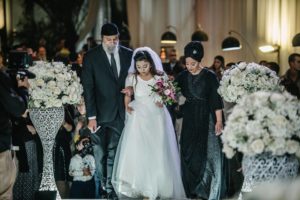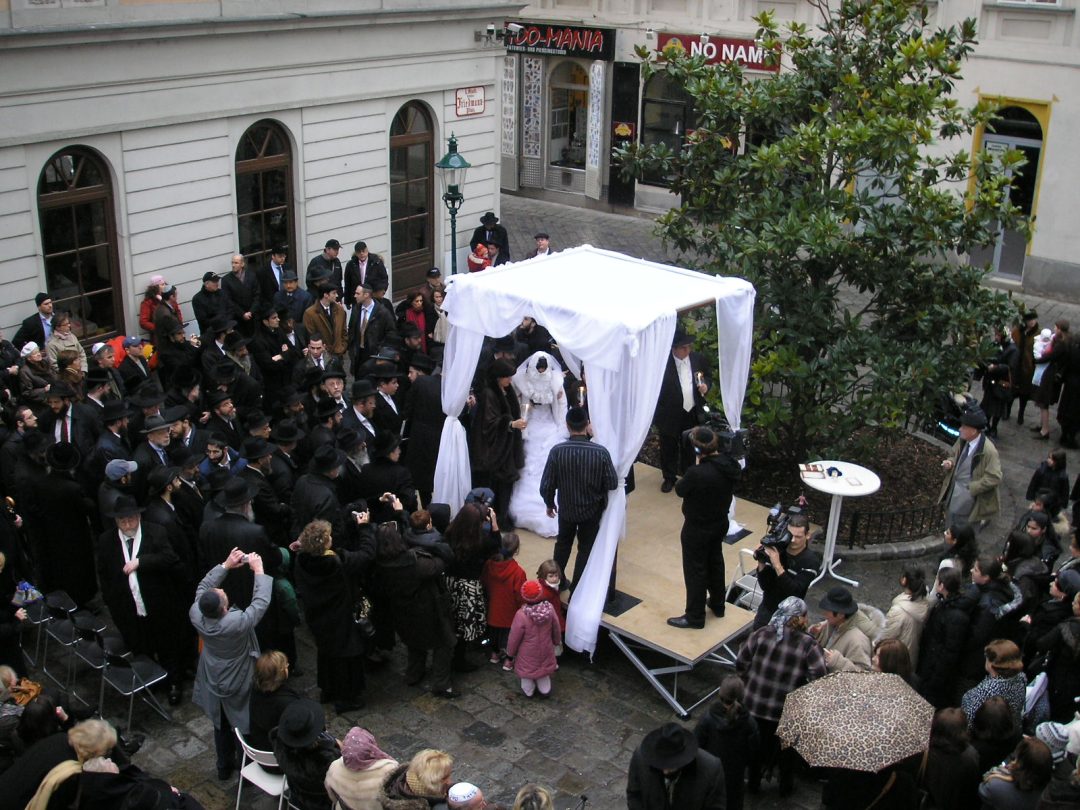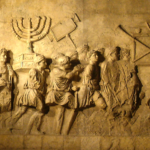If you’re thinking of planning such an event today, your choices are unlimited. You could opt for a somber, super-religious, five-hour Orthodox wedding, all recited and sung in the Hebrew language. As one humorist observed, everyone there wears long beards and head coverings, including the bride’s bubbie (grandmom).
Then, everyone gathers in the synagogue’s dining room to toast the new bride and groom, followed by a sumptuous kosher meal that may consist of gefilte fish, half-sour pickles, chicken soup with matzoh balls, boiled beef flanken, lotkas (potato pancakes) and, for dessert, honey cake and Jewish jelly candies. Then, some of the male guests will balance wine glasses on the top of their skull-cap yarmukles and perform a slow, elegant dance. (See wedding scene in the movie, “Fiddler on the Roof”).
They may also pick up the bride and groom while the couple is still sitting in their chairs, lift them high over their heads and dance around the dining room to the cheers and congratulations of everyone present. The attendees could consist of hundreds of family, friends, and neighbors.
Book a ten-minute ceremony
On the other extreme, you may just book a ten-minute ceremony at a wedding chapel on the Las Vegas Strip. You can hire an official justice of the peace who’s also an Elvis impersonator in full costume, who, in honor of the religious implications, wears a yarmulke with a spinning propeller on top. The bride and groom may wear anything from tank tops, jeans to walking shorts and open-toed sandals. The guest list could consist of from one to a dozen, depending on how many gamblers you convince to come with you from the hotel.
 Of course, there are many, many options in between the two extremes, and seemingly endless factors to consider in planning for a wedding. If both the prospective bride and groom are Jewish, the situation is simple and easy to follow tradition. If members of a synagogue, the couple should allow at least a month for the rabbi and other experts to confer with the families on the date, costs, ceremony and all other aspects. In some busy, big city synagogues, the reservation day may not be permitted for months, perhaps a year. Therefore, it is essential to start planning as early as possible.
Of course, there are many, many options in between the two extremes, and seemingly endless factors to consider in planning for a wedding. If both the prospective bride and groom are Jewish, the situation is simple and easy to follow tradition. If members of a synagogue, the couple should allow at least a month for the rabbi and other experts to confer with the families on the date, costs, ceremony and all other aspects. In some busy, big city synagogues, the reservation day may not be permitted for months, perhaps a year. Therefore, it is essential to start planning as early as possible.
Unless there is dissension, religious differences or other possible barriers, the families of the couple are also expected to participate in the planning and presentation of the wedding. It is customary for the bride’s family to take the responsibilities of financing the entire program, but negotiations usually result in splitting some of the costs. For instance, the groom’s family will volunteer to pay for several events prior to the wedding, such as rehearsal dinner and other expenses incurred before, during or after the ceremony.
Orthodox Religious Requirements for Jewish Wedding
The same rules or customs that apply to most American weddings are usually considered for Jewish weddings, except those involving the strictly Orthodox religious requirements. That option will take extra careful consultations and planning with the rabbi and other synagogue officials as to dietary laws, dress code and behavior standards for all guests, both Jewish and others. Among responsibilities are choosing a day for the ceremony that is permissible in the Jewish calendar, as well as the time of the day and other possible religious restrictions.
Consult all aspects of the protocol and religious options
Although a ceremony to be conducted by a Conservative or Reformed rabbi allows much more leeway, it is advisable for the couple and their parents to consult all aspects of the protocol and religious options thoroughly with the clergyman or woman who’ll perform the ceremony. Although it is impossible to have an Orthodox rabbi perform a wedding where one of the participants is not Jewish, if that situation exists with the couple, it will require serious discussions with a Conservative or Reformed rabbi before or if approval comes. If one of the participants is widowed or divorced, similar considerations must be discussed and resolved.
 Once all agreements are settled, and the date, place, menu and other factors are in place, the bride’s family sends out invitations to all who are expected to attend the ceremony and/or the social events concerned with it. Because the bride’s parents may be the ones with the most financial obligations, they should have the final say in the names and numbers of invitees.
Once all agreements are settled, and the date, place, menu and other factors are in place, the bride’s family sends out invitations to all who are expected to attend the ceremony and/or the social events concerned with it. Because the bride’s parents may be the ones with the most financial obligations, they should have the final say in the names and numbers of invitees.
Depending on the decision on formality, the invitations must mention the expected dress code. Usually, the bride selects her own gown and determines the style of bridesmaids’ dresses, and sometimes the clothing of all others in the wedding party. Her father, while responsible for most everything else, usually hires the photographer/videographer, orders the wines and liquors and can expect to go home from the wedding with a much lighter wallet.
As some humorists once observed, a successful Jewish wedding is one that ends with everyone, bride and groom, mothers and fathers and all other relatives not trying to kill each other.






